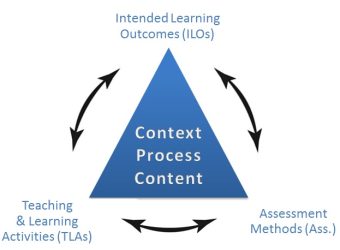Constructive Alignment
“Constructive alignment makes quite explicit the standards needed if the intended learning outcomes are to be achieved and maintained.” (Biggs & Tang, 2015, p. xiv).
Constructive Alignment refers to an approach to instructional design by Biggs & Tang (2011) that integrates:
a) Learning Outcomes (ILOs) or learning objectives
b) Instruction (i.e., teaching and learning activities)
c) Feedback and Assessment.
As shown in figure 1, CoAl requires optimal coherence between these three elements in a course or curriculum. Moreover, CoAl underpins and assures the quality of an educational programme.

We approach CoAl with an emphasis to the assessment element. The ‘assessment drives learning’-principle stresses the importance to maintain connection between intended learning outcomes (ILOs), teaching & learning activities (TLAs) and assessment (Ass.), both on a course, programme level and to a lesser extent on institutional level. A good connection between ILOs and assessment is therefore crucial when (re-)designing curricula.
With large student populations, assessment methods are often selected based on efficiency rather than on the ability to capture the richness of the learning experience. When assessment methods do not connect well to ILOs, it becomes difficult to uphold CoAl and the quality of education is likely to be distorted (e.g. a mismatch between ‘what students need to learn’ and the type of assessment that has to test the student’s developments). When applying CoAl, the coherence between ILO, TLA and Ass. can be secured and serves as an identification of strengths of the curriculum as well as elements for improvement. CoAl can be used for quality assurance as well as sparking improvements in the design of a curriculum. We focus on quality assurance in a separate section of this website..
“The underlying principle of [constructive alignment] is that the assessment tasks should comprise an authentic representation of the course intended learning outcomes” (Biggs & Tang, 2015).
The CoAl information was developed around specific education roles. For each role a different button can be the starting point (e.g. course vs. programme level). The buttons in the pannel below provide short theoretical abstracts combined with cases based on authentic UM settings. It serves those stakeholders in higher education that are responsible for the creation and/or coordination on ILOs, teaching, assessment and the coherence between them. This guide is particularly useful for:
- Boards of Examiners: are responsible for the quality assurance of assessment in general to reach and to guarantee the accomplishment of institutional/programme/course ILOs.
- Course coordinators: carry the responsibility of linking course-ILOs to programme ILOs.
- Education quality-care staff: provide educational advice on evaluation and improvement of the programme.Programme Committee: an advisory and participation body (‘opleidingscommissie’) that evaluates and advises on the execution of the EER (Educational and Examination Regulation) and quality assurance of the programme EER.
- Programme Directors: carry the final responsibility for the quality of the educational programme and the tuning of the separate units.
- Tutors: infuse awareness of ILOs (course/programme/institutional) on a meta-level to the students resulting in a better tuning of ILO’s and activities of tutorial groups.
- Vice-deans education & Management team: has the final responsibility for the quality assurance of the curriculum.
This information is a production of the Maastricht University Institute for Education Innovation (EDLAB). A group of constructive alignment experts from all UM faculties has worked together at EDLAB over the course of 2016 to share and write down their knowledge and experiences regarding constructive alignment. This information can be viewed on this website and has been bundled in a downloadable handbook.
EDLAB is grateful for all the input it has received and wants to thank all the UM colleagues involved in the process. A special thanks goes to following authors: Joost Dijkstra, Sylvia Gerhards, Matthijs Krooi, Marloes Menten, Elissaveta Radulova, Mark Spigt, Rina Vaatstra, Peter Vermeer, and the members of the EDLAB Assessment Taskforce.
Biggs, J. B. (2011). Teaching for quality learning at university: What the student does. McGraw-Hill Education (UK)
